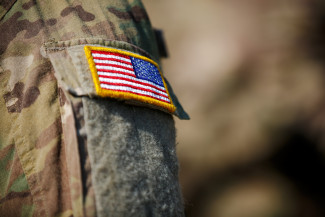
Johns Hopkins UniversityEst. 1876
America’s First Research University
A Changing Military, an Entrenched Culture


Earlier this month, the Marine Corps and other branches of the U.S. armed forces came under fire after service members posted nude and partially nude photos of their fellow personnel to Facebook and other websites. When Marine veteran Erika Butner discovered photos of her posted on a closed Facebook group called Marines United, she hoped that the Marines would not dismiss the incident as a type of “boys will be boys” prank. Butner is a rape survivor, and she told a reporter that this type of behavior can lead to sexual violence. The Pentagon has launched an investigation into the matter, and U.S. Secretary of Defense James Mattis issued a statement in which he asserted that “Lack of respect for the dignity and humanity of fellow members of the Department of Defense is unacceptable and counter to unit cohesion.” Mattis went on to say that “We will not excuse or tolerate such behavior if we are to uphold our values and maintain our ability to defeat the enemy on the battlefield.” Far from dismissing the incident as an example of “boys will be boys” behavior, Mattis cast it as the type of activity that destroys unit cohesion and undermines the Marines’ ability to perform its missions.
The story and subsequent ongoing investigation illustrate the difficulty of changing deep-seated cultural attitudes about men, women, and military service even as legal and institutional changes go into effect to open the armed forces to women more fully. Attitudes and behaviors on display in the Marines United incident reflect not just a type of military culture but a much broader civilian culture which offers tacit approval of the objectification of women’s bodies and heterosexual male entitlement to images of them. Marines United brings to mind Tailhook, another private organization with heavy Marines and Navy membership, which got into serious trouble in 1991 when members at its annual convention sexually assaulted male and female attendees. In the context of contemporary culture from the Anita Hill case in the 1990s to the proliferation of rape and sexual assault on college campuses in recent years, we can see the impact of civilian culture on women’s experiences in the military. Given this type of continuity in the interplay between the U.S. military and civilian worlds, Integrating the U.S. Military offers useful historical context for contemporary civil-military relations.
The chapters in our book encourage readers to ask questions that are relevant to the U.S. military from the mid-twentieth century to the present day. Who is a soldier? What is combat? Why have the U.S. armed forces banned certain Americans from service based on race, gender, or sexuality? What has motivated military authorities to lift service restrictions? When we think of military culture, we often think of hypermasculine, aggressive, heterosexual behavior – and men – which may lead us to wonder where that image originated. Is it a military idea, or does it stem from a broader civilian mindset? If it's the latter, why have Americans invested in this particular image? What does it tell us about American identity? Where have we seen its limits and resistance to it? Integrating the U.S. Military will help readers see the ways in which leaders of the armed forces have responded to social changes in the civilian world and have been pragmatic progressives in positioning the military as a vanguard of social change in order to meet practical personnel needs. It will also guide readers through the much more entrenched conventional wisdom to which Americans cleave about who should serve in the armed forces and why.
Heather Marie Stur is an associate professor of history at the University of Southern Mississippi and a fellow at the Dale Center. She is the author of Beyond Combat: Women and Gender in the Vietnam War Era and the co-editor of Integrating the US Military: Race, Gender, and Sexual Orientation since World War II.


